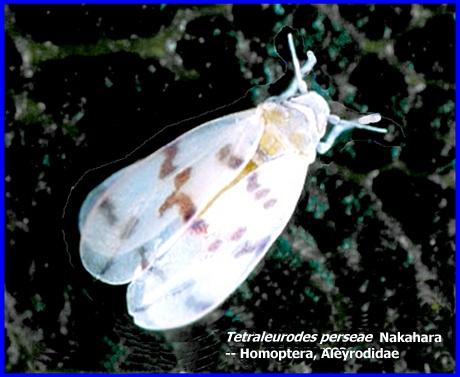File: ch-129.htm GENERAL INDEX [Navigate to MAIN MENU
]
Link to: <UC-Biocontrol>
|
RED BANDED WHITEFLY Tetraleurodes perseae
Nakahara -- Homoptera, Aleyrodidae ----- CLICK on Photo to enlarge
& search for Subject Matter with Ctrl/F. GO TO ALL: Bio-Control Cases
Biological control of Tetraleurodes
perseae is desireable if to keep densities low enough as
to not cause economic damage.
California avocados are produced with minimum insecticide treatments
and rely on natural enemies to control most pest species in the orchards. Red-banded whiteflies are under very good
control in Mexico by two Encarsia spp. and
one Eretmocerus sp. of parasitoid (both Hymenoptera:
Aphelinidae). Dr. Mark Hoddle of the
University of California maintains that in California, these Mexican
parasitoids are absent, but Cales noacki Howard,
a parasitoid released for woolly whitefly (Aleurothrixus floccosus [Maskell])
control can parasitize up to 92% of red-banded whitefly nymphs in some
coastal areas (Rose & Woolley, 1984a, 1984b). However, this level of control is not sustained in all areas
and Tetraleurodes perseae appears to be less
effectively controlled by C. noacki in more
interior avocado growing areas where summer temperatures are more extreme. REFERENCES: [Additional references may be found at: MELVYL Library ] Nakahara, S. 1995.
Taxonomic Studies of the genus Tetraleurodes (Homoptera:
Aleyrodidae). Insecta Mundi 9:
105-150. Rose, M. & Woolley, J. B. 1984a.
Previously imported parasite may control invading whitefly. California Agriculture 38: 24-25. Rose, M. &
Woolley, J. B. 1984b. Previously imported parasite may control
invading whitefly. California Avocado
Society Yearbook 68: 127-131. |
